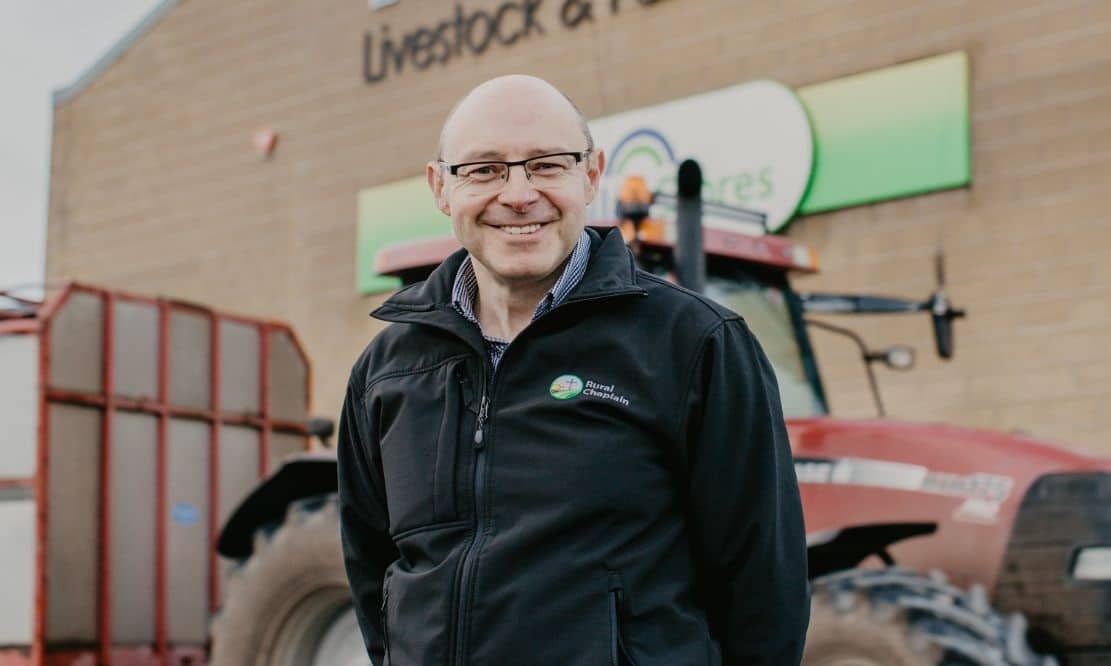
Despite their reputation for resilience and hardiness, farmers are impacted by a huge array of challenges on a daily basis.
This has led to an increase in depression and poor mental health across the agricultural community, an area where it very often goes unrecognised in wider society.
The issue was recently highlighted by Upper Bann MP and the DUP’s Westminster agriculture spokesperson Carla Lockhart, who said there are real concerns for struggling farmers and their families.
This year, in a UK-wide survey commissioned by the rural charity, the Farm Safety Foundation, it was found that 95% of young farmers under the age of 40 agreed that mental health is one of the biggest ‘hidden’ problems in agriculture today.
Among those looking to advocate for farmers and raise awareness of these issues is the Rev. Kenny Hanna, Rural Chaplain for the Presbyterian Church in Ireland.
Kenny, who is a part-time farmer himself, was born and raised in Kilkeel, and was entrusted to the role of Rural Chaplain in November 2021.
He uses his position to engage with farmers and their families to provide help and advice for their physical, emotional, and spiritual well-being.
Speaking to Armagh I, Kenny is keen to highlight that farmers face all the problems that regular society does, with all the unique farming difficulties compounded on top of that.
“When you look at all the issues that are problematic in society, whether it’s the cost-of-living crisis, mental health or even wider uncertainty in the world, such as the Middle East and Ukraine, plus concerns about your own family, farmers have all those problems, plus their own unique issues and challenges.
“They have the same issues and challenges that everybody else in society faces, and their own range of issues on t0p of that.
“One issue that maybe isn’t often recognised is the weather,” Kenny explains, pointing to the bad weather faced by farmers from last summer right up to March of this year.
“That’s problematic for all kinds of reasons. For one thing, it meant that cattle were late being turned out of the house because the ground was so wet, and that means extra costs, extra labour, and extra work. As a whole, the farming calendar was about a month behind.
“The weather is a massive factor in farming. We often complain about cold air and a bit of wet weather, but the wet weather affects farmers more than most other people in terms of work.”
Kenny also points to the recent mental health statistics as a huge issue for the farming community, and one that hinders young people getting involved in what is an ageing industry.
He continued: “You might hope that young farmers would be more optimistic, but they are looking beyond to the deeper mental health issues. That’s really concerning.”
Among those issues that adds to the stress and mental health toll of farmers is the prevalence of Bovine tuberculosis, or TB.
“Last year government figures tell us that around about 11% of cattle herds in Northern Ireland have a TB reactor. That means the herd was closed and they weren’t able to sell livestock. Some of those herds would have had cattle slaughtered because they were infected with TB. Some could have had almost all their herds wiped out because of the compulsory slaughter scheme.
“There’s all kinds of factors there. One is financial – so if you’ve got beef cattle, you can’t sell them at the mart and you have to keep them unless that TB restriction gets lifted. If those restrictions aren’t lifted, you have to keep your cattle until they’re of age to be sold for beef. That’s a huge height in your input costs.
“Even worse than the financial cost is the mental and emotional cost because farmers are greatly attached to their livestock. We love them and care for them and love what we do. Imagine having a dairy herd and you can trace back through generations a cow’s mother, grandmother and maybe her great-grandmother.
“Let’s imagine that whole family line of cows is wiped out with TB. Imagine the mental health side of that.”
Kenny argues that the issue “isn’t really being tackled” at government level and that there needs to be clear policy introduced.
“Other parts of the UK and the Republic of Ireland have introduced schemes to try and deal with this. They have had pilot schemes, and they’ve discovered that those schemes have really, markedly reduced the incidents of TB.
“Our government here doesn’t have that. There was a scheme to be piloted for this in Northern Ireland, but that scheme was pulled.”
Kenny adds that bureaucracy and red tape is another factor that’s contributing to poor mental health among farmers.
He explained: “There’s lots of red tape for farmers. Lots of bureaucracy and lots of form-filling, and that just seems to be increasing. That’s a huge problem for farmers, and particular older farmers.
“I think it’s getting that balance between doing things properly and not just being bogged down in bureaucracy and red tape.”
A further issue facing today’s farmers is that of succession – meaning where a farm will be passed to when the owner dies.
“This is a huge issue in farming,” Kenny said. “There’s a huge pressure on farmers to do the right thing by their families.”
According to 2018 DAERA equality indicators statistics, the mean age of farmers in Northern Ireland is 59. 36% of managers of a family farm in Northern Ireland are over the age of 65 and only 8% are under the age of 40.
On October 9, Agriculture, Environment and Rural Affairs Minister Andrew Muir MLA announced the launch of the Farming for the Generations pilot scheme, which aims to raise awareness of the need for succession planning on farms to help ensure long-term sustainability.
The Minister said: “The new Planning for Succession element of the pilot will target 60 farm families and will include support for the farm business to develop a succession plan, a farm business review and a Personal Development Plan for the successor.
“I am delighted to announce that Rural Support will be delivering this pilot scheme on behalf of DAERA. Rural Support have a great depth of experience on this issue and are well respected across our farming community.”
Kenny also says farmers need to be fairly paid for their produce.
“Farmers would much rather be fairly paid for our produce and not need to take subsidies. If you receive a fair price, subsidies are irrelevant. But the subsidies are to subsidise our farms because many of them are not sustainable because our Farm Gate prices are very low and they’re always erratic.
“Farmers don’t know from one month to the next what they’re going to receive for lamb or beef or milk. That’s an untenable situation for any industry. It’s very difficult, if not impossible, to make medium to long-term plans and to encourage the next generation of young farmers to work their land. It’s an impossibility really.
“The average age of farmers in Northern Ireland is increasing and you can’t blame young farmers. Folk can look at it and say, ‘well I can have a wage, I can have employment, I’d finish at 5pm, go home in the evenings and spend time with my family and I’d know my wage’. Whereas on the farm, there’s no guaranteed wage.
“That’s an unreasonable way to expect people to live. And it’s untenable.”
He continued: “A lot of government policy is predicated on there being cheap food, but the cost is then being paid by the farmer and that makes it difficult to attract the new generation of young farmers.
“If we can’t produce our own food, then you have the issue of food security. The war in Ukraine has shown how unpredictable the food markets are, and we can’t rely on other countries to be producing our food for us.
“If they [farmers] are not able to produce food because they’re not receiving a fair, sustainable price, then who’s going to produce our food in the generations to come? If young farmers aren’t doing it, then we’re relying increasingly on other countries to produce our food.
“What happens if international relationships become more and more frosty, and it becomes increasingly difficult for us to import food? We need to be sustainable ourselves.
“Food production needs a robust, well-resourced farming industry that’s fairly rewarded for what we produce.
“It’s important to make the point that farmers are part of wider society. What happens to farmers affects all of us.”
Through his work with the PCI Rural Chaplaincy, Kenny attends livestock markets and helps farmers and their families with pastoral care, alongside arranging events with local churches.
He concluded: “We’re here supporting farmers of all backgrounds. We visit folk in their homes, or wherever they feel comfortable, and help them pastorally. We also do events with a whole range of farm support organisations.
“Ultimately, we’re pointing people to Jesus, and to trust in Him and not ourselves. In a society where there’s so much hopelessness, we want to say that Jesus brings us hope that no one else can give us.”
The Rural Chaplaincy will be holding a ‘Good News at the Co-op’ event in Rathfriland from Thursday, November 14, to Sunday, November 17.
Rural Chaplain Rev Kenny Hanna can be contacted on mobile: 07938 488372, or email: ruralchaplain@presbyterianireland.org.






